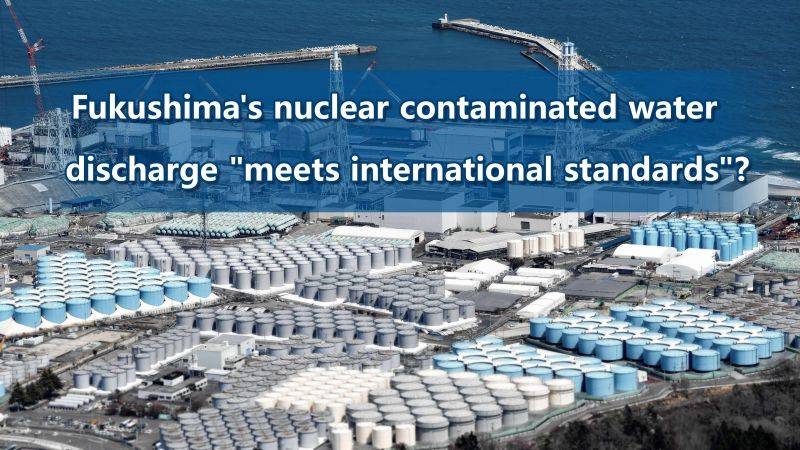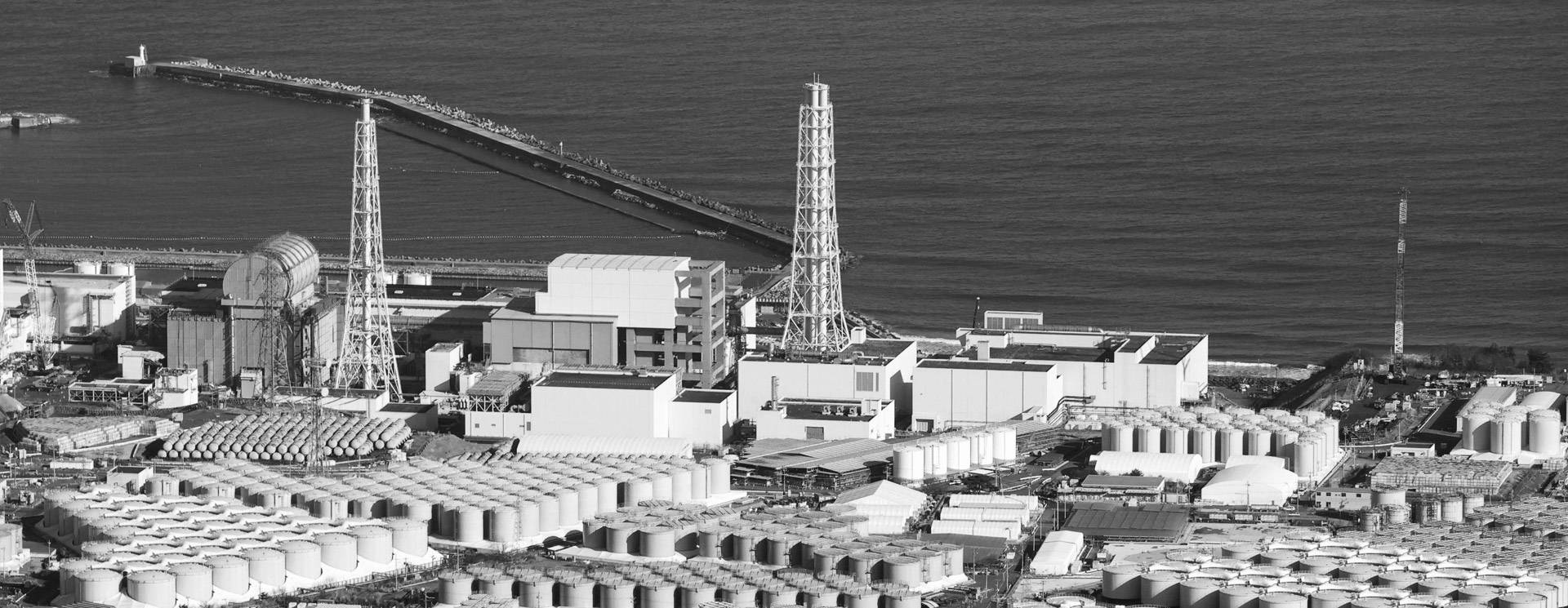
Video link:https://mp.weixin.qq.com/s/-c4Cb10JeP36_FAm13ecxA
福岛核污染水排海“符合国际标准”?
主持人:各位,这里是绿色江南《福岛核污染水专题》访谈面对面,我是主持人雨歌。
2023年7月4日,国际原子能机构总干事格罗西在日本东京正式发布国际原子能机构关于日本福岛核污染水排海问题的综合评估报告,称经过安全审查,国际原子能机构认为,日本将福岛第一核电站储存的核污染水排向大海的计划符合该机构的安全标准。此结论一出,立刻引起国际舆论的哗然。那么国际原子能机构发布的结论是否可靠?今天我们邀请到了绿色江南创始人方应君主任为我们解答。
主持人问:请问方主任,国际原子能机构称福岛核污染水符合该机构的安全标准,此结论是否可靠?
方应君主任:关于这个问题,国际原子能机构发布的这份综合报告在扉页一段声明中强调,报告中提出的见解并不必然反映国际原子能机构成员国的看法,“国际原子能机构及其成员国对利用这一报告引发的任何后果不承担责任”。且在这份综合评估报告发布之初,中国国家原子能机构秘书长邓戈在《环球时报》等媒体采访时表示,国际原子能机构邀请多国专家参与对日本福岛核污染水处置问题审查评估,但报告却未能充分反映所有专家意见,相关结论存在局限性和片面性。
目前,日本东电针对福岛核污染水的数据信息并不完善,也并未进行全面公开,尤其是除了氚之外的放射性核素。据了解,日本东电为降低计划最先排放的核污染水中的氚活度,计划用海水稀释至每升水1500贝克勒尔以下排放。但目前核污染水中已知的放射性核素除氚之外还有60多种,很多核素尚无有效处理技术,日本东电只用氚的浓度代表核污染水的处理效果,是以偏概全、避重就轻的说法。
国立日本原子力研究开发机构研究员天野光曾表示,日本的污染物排放法律是所谓的浓度规定,并没有限制总量,只要污染物稀释至低于排放标准,就不会有问题。但对于污染物尤其是放射性核素而言,总量控制十分重要,因为放射性核素半衰期长,极易在海洋生物中积累。核污染水排放对海洋环境影响程度,取决于包括放射性核素总量、种类等在内的五大因素,以及特定放射性核素与沉积物、海洋生物等海洋环境关键要素相互作用等复杂过程。近日,中国驻日本大使在召开记者会时表示,日方采用稀释方式降低核污染水中放射性核素的浓度,而不对所有放射性核素进行总量控制,淡化核污染水排海危害,违背科学、专业精神。
此外,中国国家原子能机构还认为日方没有证明核污染水数据的真实准确性。国际原子能机构仅基于日方单方面提供的数据和信息开展审查评估,仅对日方单方面采集的少量的核污染水样本开展实验室间比对分析,在数据真实性、信息准确性有待确证,取样独立性和代表性严重不足的情况下,即使国际原子能机构审查评估作出排海符合国际安全标准的结论,也缺乏足够的说服力。希望日方在未就核污染水排海决定正当性、净化装置可靠性、源项数据真实性、环境影响不确定性等提供可信证据并获得邻国等利益攸关国家谅解,未就国际原子能机构提出的评估意见采取有效整改措施前,不得启动排海。
主持人:我们希望日本政府本着为对全人类和子孙后代负责任的态度,尊重周边国家利益,听听国际民众声音,心存畏惧之心,停止强行推进核污染水排海,充分研究论证排海以外的安全处置方案,切实以科学安全透明的方式处置核污染水,并接受全人类的监督。
绿色江南将持续关注福岛核污染水排海计划的进展。
Fukushima's nuclear contaminated water discharge "meets international standards"?
Compere: Ladies and gentlemen, this is Lvse Jiangnan "Fukushima nuclear contaminated water topic" interview face-to-face, I am the host Yu Ge.
On July 4, 2023, the Director General of the International Atomic Energy Agency (IAEA), Mr. Grossi, formally released in Tokyo, Japan, the IAEA's Comprehensive Assessment Report on the Discharge of Nuclear Contaminated Water from Japan's Fukushima Nuclear Power Plant to the Sea, stating that, after a safety review, the IAEA had concluded that Japan's plan for discharging to the sea nuclear contaminated water stored at the Fukushima Daiichi Nuclear Power Plant complied with the Agency's safety standards. This conclusion immediately caused an uproar in international public opinion. So is the conclusion issued by the IAEA reliable? Today we invited Mr. Fang Yingjun, the founder of Lvse Jiangnan, to answer this question for us.
Compere: May I ask Director Fang whether the International Atomic Energy Agency's conclusion that the contaminated water in Fukushima meets the Agency's safety standards is reliable?
Fang Yingjun: On this issue, the comprehensive report released by the International Atomic Energy Agency (IAEA) emphasized in a statement on the title page that the insights presented in the report do not necessarily reflect the views of IAEA member states, and that "the International Atomic Energy Agency and its member states do not bear responsibility for any consequences arising from the use of this report." Moreover, at the beginning of the release of the comprehensive assessment report, Deng Ge, Secretary-General of the National Atomic Energy Agency of China, said in an interview with the Global Times and other media that the Agency had invited experts from many countries to participate in the review and assessment of the disposal of contaminated water in Fukushima, Japan, but the report failed to fully reflect the views of all the experts, and that the relevant conclusions were limited and one-sided.
At present, Japan's TEPCO data information for Fukushima's nuclear contaminated water is not perfect and has not been fully publicized, especially for radionuclides other than tritium. It is understood that Japan's TEPCO plans to reduce the tritium activity of the first discharge of nuclear contaminated water, plans to use seawater diluted to 1500 Becquerel per liter of water below the discharge. However, at present, there are more than 60 known radionuclides other than tritium in the nuclear contaminated water, many of which do not yet have effective treatment technologies, and the fact that TEPCO only uses the concentration of tritium to represent the effectiveness of treatment of the nuclear contaminated water is a generalization that avoids the whole picture and avoids the importance of the issue.
Mitsuko Amano, a researcher at the National Institute of Atomic Energy Research and Development, has said that Japan's law on pollutant discharge is a so-called concentration regulation, and there is no restriction on the total amount, and as long as the pollutants are diluted to below the discharge standard, there will not be any problem. However, for pollutants, especially radionuclides, the total amount control is very important because radionuclides have a long half-life and are very easy to accumulate in marine organisms. The extent of the impact of nuclear contaminated water discharges on the marine environment depends on five major factors, including the total amount and types of radionuclides, as well as complex processes such as the interaction of specific radionuclides with key elements of the marine environment, such as sediments and marine organisms. Recently, the Ambassador of China to Japan stated at a press conference that the Japanese side's use of dilution to reduce the concentration of radionuclides in the nuclear contaminated water, without controlling the total amount of all radionuclides, and downplaying the hazards of discharging nuclear contaminated water into the sea is contrary to the spirit of science and professionalism.
In addition, the National Atomic Energy Agency of China is of the view that the Japanese side has not proved the truthfulness and accuracy of the data on nuclear-contaminated water. The International Atomic Energy Agency conducted its review and assessment only on the basis of the data and information unilaterally provided by the Japanese side, and carried out inter-laboratory comparison and analysis of only a small number of nuclear contaminated water samples unilaterally collected by the Japanese side. In the case where the authenticity of the data and accuracy of the information are yet to be confirmed, and the independence and representativeness of the sampling is seriously insufficient, even if the International Atomic Energy Agency made a conclusion that the discharge of sea water complied with the international safety standards in its review and assessment, the conclusion is still insufficiently convincing. It is hoped that the Japanese side will not make a decision on the nuclear contamination issue until it has made a decision. It is hoped that the Japanese side will not initiate the discharge of nuclear-contaminated water until it has provided credible evidence of the legitimacy of the decision to discharge nuclear-contaminated water into the sea, the reliability of the decontamination device, the authenticity of the source data and the uncertainty of the environmental impact, and has obtained the understanding of the neighbouring countries and other stakeholder countries, and has taken effective corrective measures in response to the assessment made by IAEA.
Compere: We hope that the Japanese government will respect the interests of neighboring countries, listen to the voices of the international public, be fearful, stop forcibly pushing forward the discharge of nuclear contaminated water into the sea, fully study and validate the safe disposal plan other than the discharge of water into the sea, and dispose of the nuclear contaminated water in a scientific, safe, and transparent manner, and accept the supervision of all mankind, in the spirit of being responsible for the whole of mankind and for the future generations.
Lvse Jiangnan will continue to monitor the progress of the Fukushima nuclear contaminated water discharge program.
福島原発汚染水の海洋放出は「国際基準を満たしている」?
司会:皆さん、ここは緑色江南「福島原発汚染水特集」対面インタビュー、私は司会の雨歌です。
2023年7月4日、国際原子力機関(IAEA)のグロッシ事務局長は、東京でIAEAの福島原子力汚染水の海洋放出に関する評価報告書を正式に発表しました。それによると、IAEAは安全審査の結果、福島第一原子力発電所に貯蔵されている核汚染水を海に放出する日本の計画は、IAEAの安全基準を満たしているという結論です。この結論は直ちに国際世論を騒然とさせました。では、国際原子力機関(IAEA)が出した結論は信頼できるのでしょうか?本日は、緑色江南の創設者の方応君主任をお招きし、この疑問を回答していただきます。
司会:方主任、国際原子力機関(IAEA)が発表した「福島の汚染水はIAEAの安全基準を満たしている」という結論は信頼できるでしょうか?
方主任:この問題に関して、国際原子力機関(IAEA)が発行した報告書は、タイトルページの声明で、報告書で表明された見解は必ずしもIAEA加盟国の見解を反映したものではなく、「国際原子力機関(IAEA)およびその加盟国は、本報告書の使用から生じるいかなる結果に対しても責任を負わない」と強調しました。そして、この報告書の発表した際、中国国家原子力局の鄧戈事務局長は、『環球時報』などのインタビューに、国際原子力機関(IAEA)は多くの国の専門家を招き、日本の福島の汚染水処理の審査と評価に参加させたが、報告書はすべての専門家の意見を十分に反映することができていないので、関連する結論は限定的で一方的なものと述べました。
現在、東京電力が公表している福島原発の汚染水に関するデータ情報は、特にトリチウム以外の放射性核種については完全ではなく、十分に開示されていません。日本の東京電力は、最初に放流する予定の核汚染水に含まれるトリチウムの放射能を低減するため、海水を使って1リットルあたり1500ベクレル以下に希釈して放流する計画であることがわかりました。しかし、現在知られている核汚染水には、トリチウムのほかにも60種類以上の核種があり、まだ有効な処理技術が確立されていません。東京電力がトリチウムの濃度だけで核汚染水処理の有効性を示すのは、偏った、回避的な発言です。
日本国立研究開発法人原子力研究開発機構の天野光研究員は、日本の汚染物質の排出に関する法律は濃度規制で、総量を制限するものではないとし、汚染物質が排出基準以下に希釈されれば問題はないと考えています。しかし、汚染物質、特に放射性核種については、総量規制が非常に重要です。 放射性核種は半減期が長く、海洋生物に蓄積されやすいからです。原子力汚染水の海洋環境への排出がどの程度影響を及ぼすかは、放射性核種の総量や種類だけでなく、特定の放射性核種と堆積物や海洋生物など海洋環境の主要要素との相互作用など、複雑なプロセスを含む5つの主要な要因に左右されています。最近、駐日中国大使は記者会見で、日本側が核汚染水中の放射性核種の濃度を下げるために、全放射性核種の総量を管理する代わりに希釈を用い、核汚染水を海に流すことの危険性を軽視していることは、科学的かつプロフェッショナリズムに反していると述べました。
また、中国国家原子力局は、日本側が核汚染水データの真実性・正確性を証明していないとの見解を示しています。IAEAは、日本側から一方的に提供されたデータと情報のみに基づいて審査・評価を行って、日本側が一方的に採取した少数の核汚染水サンプルのみについて試験所間比較分析を行っているため、データの信憑性や情報の正確性はまだ確認されていません。 採取されたサンプルの独立性や代表性が欠如していることを考えると、IAEAの審査・評価が、仮に排出が国際的な安全基準に適合していると結論づけたとしても、十分な説得力を持つものではないかと考えています。日本側は、汚染水海洋放出決定の正当性、除染装置の信頼性、ソースデータの信憑性、環境影響の不確実性等について信頼に足る証拠を提示し、近隣諸国をはじめとする関係国の理解を得るとともに、国際原子力機関(IAEA)の評価に対して効果的な是正措置を講じるまでは、汚染水海洋放出を開始しないことが望まれています。
司会:私たちは、日本政府が、全人類と将来の世代に対する責任ある態度として、近隣諸国の利益を尊重し、国際社会の声に耳を傾け、恐怖感をもって、原子力汚染水の海洋放出を強引に推し進めることをやめることを望んでいます。海洋放出以外の安全な処分方法を十分に検討し、実証し、科学的で安全かつ透明性の高い方法で核汚染水を処分し、全人類の監視を受け入れるべきです。
緑色江南は福島核汚染水排出計画の進展に引き続き注目していきます。
Content source: Lvse Jiangnan WeChat public account
